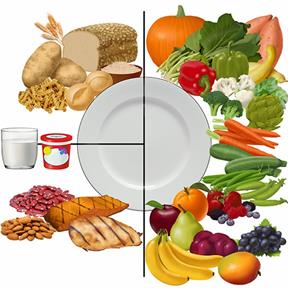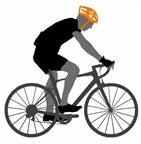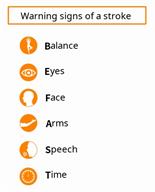Stroke: How to Prevent It
There are some things you can do to help prevent a stroke. It's important to try to prevent strokes because many very bad strokes are first-time events.
How can having a stroke affect me?
A stroke changes the life of not only the person who has the stroke but also their family and other caregivers. A stroke can lead to a brain injury.
A stroke is an emergency. It should be treated right away. You're more likely to get better after a stroke if you get help right away.
What can increase my risk?
You may be more likely to have a stroke if you have:
You may also be more at risk if:
You're older than 60 years of age.
You're very overweight.
You're not very active.
You've had a stroke or short-term symptoms of stroke (TIA) in the past.
Someone else in your family has had a stroke.
You smoke.
You drink a lot of alcohol or use a lot of drugs.
You take birth control pills, especially if you smoke.
What actions can I take to prevent a stroke?
Manage your health problems
- If you have high cholesterol:
Eat healthy.
Take medicines as told.
- If you have high blood pressure:
Eat foods that are good for your heart.
Take medicines as told.
Ask your health care provider if you should check your blood pressure at home.
Have your blood pressure checked every year.
- If you have diabetes:
- Talk to your provider about getting checked for sleep apnea. Signs may be:
Snoring a lot.
Feeling very tired.
Nutrition

Eat or drink as told. You may be told to:
Take in fewer calories each day.
Limit how much salt, or sodium, you take in.
- Use only healthy fats for cooking. These include:
Olive oil.
Canola oil.
Sunflower oil.
Count how many carbs you take in each day.
- Eat healthy. To do this:
Choose foods that are high in fiber. These include whole grains.
Eat at least 5 servings of fruits and vegetables a day. Try to fill half of your plate with fruits and vegetables at each meal.
Choose low-fat (lean) proteins. These include low-fat cuts of meat, chicken without skin, fish, tofu, beans, and nuts.
Eat low-fat dairy products.
- Avoid foods that:
Lifestyle
-
Try to stay at a healthy weight.
- If you drink alcohol:
- Limit how much you have to:
Know how much alcohol is in your drink. In the U.S., one drink is one 12 oz bottle of beer (355 mL), one 5 oz glass of wine (148 mL), or one 1½ oz glass of hard liquor (44 mL).
-
Do not smoke, vape, or use nicotine or tobacco.
-
Stay away when other people are smoking.
-
Do not use drugs.
Activity

- Get at least 30 minutes of exercise on most days, such as:
Fast walking.
Biking.
Swimming.
Medicines
- Take your medicines only as told.
- Avoid taking birth control pills. Talk to your provider about the risks of taking birth control pills if:
You're over 35 years old.
You smoke.
You get very bad headaches.
You've had a blood clot before.
Where to find more information
To learn more:
Go to the American Stroke Association at
stroke.org.
Click on the magnifying glass.
Type "stroke prevention" in the search field and find the link you need.

You have any signs of a stroke.
"BE FAST" is an easy way to remember the main warning signs:
B - Balance. Feeling dizzy, sudden trouble walking, or loss of balance.
E - Eyes. Trouble seeing or a change in how you see.
F - Face. Sudden weakness or feeling numb in the face. The face or eyelid may droop on one side.
A - Arms. Weakness or loss of feeling in an arm. This happens fast and often only on one side.
S - Speech. Sudden trouble speaking, slurred speech, or trouble understanding what people say.
T - Time. Time to call 911. Write down what time symptoms started.
Other signs of a stroke can be:
These symptoms may be an emergency. Call 911 right away.
This information is not intended to replace advice given to you by your health care provider. Make sure you discuss any questions you have with your health care provider.
 Eat or drink as told. You may be told to:
Eat or drink as told. You may be told to:
 You have any signs of a stroke. "BE FAST" is an easy way to remember the main warning signs:
You have any signs of a stroke. "BE FAST" is an easy way to remember the main warning signs: